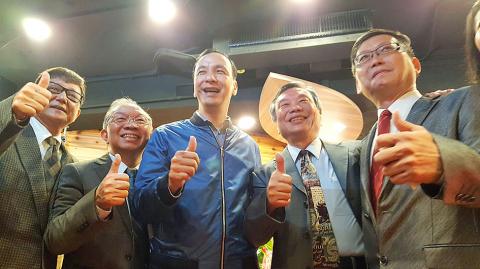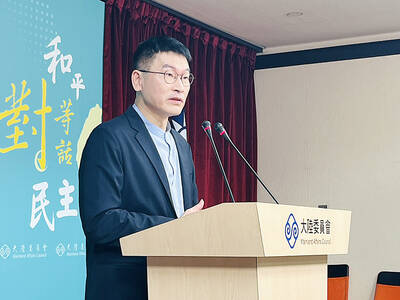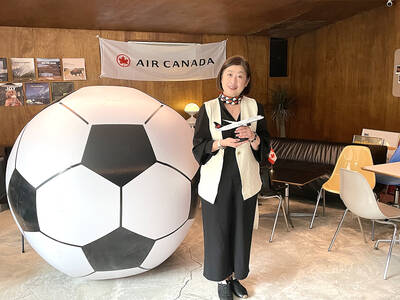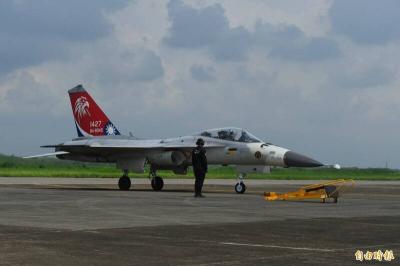The Chinese Nationalist Party’s (KMT) potential candidates for the 2020 presidential election are sparring over the rules for the party’s presidential primary.
KMT Chairman Wu Den-yih (吳敦義) on Wednesday dismissed calls within the party to select its presidential candidate through public opinion polls only, rather than a combination of opinion polls and surveys among KMT members.
Wu, who is rumored to be interested in running for president next year, said the KMT had tried before to decide its candidate based solely on public opinion polls.

Photo: Yang Hsin-hui, Taipei Times
However, not only had the polls been inundated with suspicious votes, but the candidate who was nominated based on the results was later replaced after more than 800 KMT representatives voted to support the change, Wu said.
He appeared to be referring to an incident in October 2015, when former New Taipei City mayor Eric Chu (朱立倫) replaced then-deputy legislative speaker Hung Hsiu-chu (洪秀柱) as the party’s presidential candidate for the 2016 elections.
Chu on Dec. 25 last year said he intended to vie for the KMT’s presidential nomination.
On Friday, he said that the 2016 race was not the only time the KMT had used opinion polls, as they had been used in some mayoral and county commissioner elections.
“[Deciding a candidate] based solely on public opinion polls will be a more acceptable method to the public,” Chu said, adding that he believes all party members would be able to unite in their support for candidates as long as they are selected using a fair and open mechanism.
Wu yesterday said that the KMT had tried using an array of methods to decide its candidates, including using public opinion polls only, votes among party members, votes among party representatives, and a combination of public opinion polls and party member surveys.
The method most preferred by the party’s candidate hopefuls would be open to discussion, he said, adding that nominating a candidate based on party members’ votes would be similar to the mechanism adopted by the US.
“There is no right or wrong method. As long as we choose the most appropriate method at the time, that is the right method,” he said.
A survey published by the Taiwan Brain Trust think tank on Dec. 20 showed that in a hypothetical two-legged race against President Tsai Ing-wen (蔡英文), Wu would be the only one of three possible KMT candidates who could not beat Tsai.
The other two candidates were Chu and Kaohsiung Mayor Han Kuo-yu (韓國瑜).
KMT Organizational Development Committee director Lee Che-hua (李哲華) on Friday said that the party would use public opinion polls only if the method is preferred by more than half of the candidate hopefuls.
Otherwise, the party would use a combination of opinion polls and party member surveys, with their results weighing 70 percent and 30 percent respectively, Lee said.

LOW RISK: Most nations do not extradite people accused of political crimes, and the UN says extradition can only happen if the act is a crime in both countries, an official said China yesterday issued wanted notices for two Taiwanese influencers, accusing them of committing “separatist acts” by criticizing Beijing, amid broadening concerns over China’s state-directed transnational repression. The Quanzhou Public Security Bureau in a notice posted online said police are offering a reward of up to 25,000 yuan (US$3,523) for information that could contribute to the investigation or apprehension of pro-Taiwanese independence YouTuber Wen Tzu-yu (溫子渝),who is known as Pa Chiung (八炯) online, and rapper Chen Po-yuan (陳柏源). Wen and Chen are suspected of spreading content that supported secession from China, slandered Chinese policies that benefit Taiwanese and discrimination against Chinese spouses of

PROMOTION: Travelers who want a free stopover must book their flights with designated travel agents, such as Lion Travel, Holiday Tours, Cola Tour and Life Tours Air Canada yesterday said it is offering Taiwanese travelers who are headed to North America free stopovers if they transit though airports in Japan and South Korea. The promotion was launched in response to a potential rise in demand for flights to North America in June and July next year, when the US, Canada and Mexico are scheduled to jointly host the FIFA World Cup, Air Canada said. Air Canada offers services to 13 of the 16 host cities of the tournament’s soccer games, including Toronto and Vancouver; Mexico City, Guadalajara and Monterrey in Mexico; Atlanta, Georgia; Boston; Dallas; Houston;

The US approved the possible sale to Taiwan of fighter jet spare and repair parts for US$330 million, the Pentagon said late yesterday, marking the first such potential transaction since US President Donald Trump took office in January. "The proposed sale will improve the recipient's capability to meet current and future threats by maintaining the operational readiness of the recipient's fleet of F-16, C-130," and other aircraft, the Pentagon said in a statement. Trump previously said that Chinese President Xi Jinping (習近平) has told him he would not invade Taiwan while the Republican leader is in office. The announcement of the possible arms

ALIGNED THINKING: Taiwan and Japan have a mutual interest in trade, culture and engineering, and can work together for stability, Cho Jung-tai said Taiwan and Japan are two like-minded countries willing to work together to form a “safety barrier” in the Indo-Pacific region, Premier Cho Jung-tai (卓榮泰) yesterday said at the opening ceremony of the 35th Taiwan-Japan Modern Engineering and Technology Symposium in Taipei. Taiwan and Japan are close geographically and closer emotionally, he added. Citing the overflowing of a barrier lake in the Mataian River (馬太鞍溪) in September, Cho said the submersible water level sensors given by Japan during the disaster helped Taiwan monitor the lake’s water levels more accurately. Japan also provided a lot of vaccines early in the outbreak of the COVID-19 pandemic,